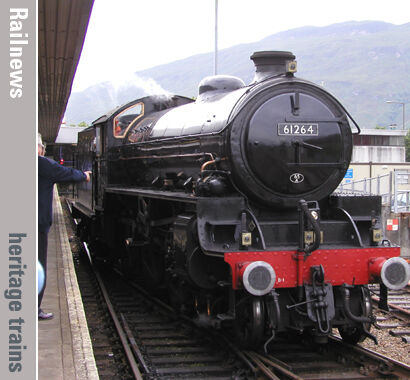Changes to the rules about central door locking could mean the end of heritage trains on Network Rail infrastructure, a major operator has warned.
West Coast Railway Company, which runs many steam-hauled specials on National Rail lines as well as the scheduled ‘Jacobite’ service between Fort William and Mallaig, is challenging a decision by the Office of Rail and Road to revoke an exemption which allows heritage trains on the main network even though they are not fitted with full central locking for their swing doors.
Instead, operators like West Coast have been permitted to use a modified system, which includes stewards in each coach who bolt the doors individually using secondary door locking. They are also responsible for monitoring the doors while the train is in motion.
West Coast has warned that converting its coaching fleet to full central locking would cost £7 million. This would take almost 10 years to repay, and the business would cease to be a going concern.
The operator has challenged the ORR’s decision in the High Court over the past two days, but judgment has been reserved and may not be known for several weeks.
West Coast pointed out that safety is its priority and there have been no accidents caused by its present door locking system.
The operator’s commercial manager James Shuttleworth said: ‘This country was the birthplace of railways and I very much hope it won’t be the death of our steam power on the main line. Specialist railways are one thing, but to truly experience the beauty and power of steam we still need our most famous trains to run on the real railway.
‘Our services, particularly the Jacobite, have become an intrinsic part of Scottish tourism; they’re lynchpins. They have helped build up local economies, which we’re extremely proud of. When we first started operating the Jacobite in 1995, I don’t think we could have predicted how popular an attraction it would become.
‘Safety is, of course, WCR’s priority and WCR supports the ORR’s desire to continue to drive safety improvements. The challenge we have is the cost of installing a modern safety system on carriages from a different era. Our decades of operational experience suggest to us that a steward to four doors, with secondary locks and monitoring, a train manager and a guard is enough to ensure the safety of our passengers and colleagues.’
Heritage trains running on main lines have been criticised in recent years, particularly when reckless ‘enthusiasts’ trespass on the railway because a train hauled by a locomotive like the Flying Scotsman is due to pass.
A major accident was only narrowly avoided at Wootton Bassett Junction on the Great Western Main Line in March 2015, when a steam special almost collided with an HST because the driver of the steam locomotive had passed a signal at danger, overrunning it by almost 700 metres and coming to a stand fouling the main line. The train’s operator West Coast Railway Company was temporarily banned from running heritage specials.
In June 2016 West Coast was fined £200,000 with costs of £64,000 at Swindon Crown Court, while the driver was given a prison sentence of four months, suspended for eighteen months. Both the driver and West Coast had admitted health and safety offences. The RAIB later reported that both the AWS and TPWS on the locomotive had been isolated, against the rules. In evidence, the ORR said its inspectors had uncovered 'significant failings in WCRC’s managerial controls'. It added: ‘This prosecution has led to WCRC taking significant steps to improve its management of safety, with support from the regulator.’


